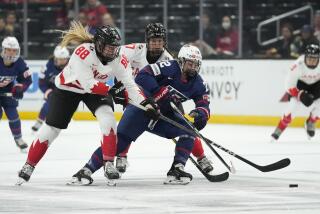Different Twist in Plot Gives Hockey a Southern Exposure : Hockey: Roller version of game has its converts, who now are waiting for a professional league to emerge.
- Share via
NATIONAL CITY — Paul Chapey was sitting in the bleachers of the cavernous Skate San Diego roller rink here Tuesday. It was hot and muggy, but Chapey detected a certain electricity inside the place called the “Hoserdome” in honor of his team: the Hosers.
A hockey game was being played and a pack of teen-agers sat behind him hollering and chanting, their shrill voices reverberating off the old rink’s concrete walls and the giant wooden beams supporting its rainbow ceiling.
A great place to be; a great day for hockey.
Chapey’s team appeared ready to capture its first title in the Roller Hockey National Championships on their home wood. The week-long tournament ends today at about 11 p.m. The Hosers will play four games today, their final contest at 9 p.m.
Chapey was excited, but not about the national tournament and not about the Hosers.
Instead, he spoke of something he hopes will be introduced in August: Roller Hockey International.
A professional league.
Chapey, 48, a Brooklyn, N.Y., native who photographs models and markets bikinis for a living when he’s not hanging out in roller rinks, will be executive director of RHI. Like others staking their dollars and reputations on this risky venture, Chapey envisions healthy crowds inside large venues watching hockey in the summer. He compares it to Major Indoor Lacrosse.
“It’s going to fly,” said Chapey, who lives in Leucadia and has directed the national roller hockey championships the past three years. “The plane’s going to take off and we’ve got to see where it goes. In the shortened season, we’ve got to see what kind of an event we put on, how the fans react . . . and from there we will see if it goes beyond that.
“I think it’s going to.”
In San Diego, it has already started with more of a fizzle than a bang.
The shortened season of which Chapey speaks is an eight-game North American tour between Team USA and Team Canada, which starts Aug. 13 at the Forum in Inglewood as a prelude to what league President Dennis Murphy hopes will blossom into 16 teams playing 32 games in 1993.
The tour was supposed to make a stop at the San Diego Sports Arena on Aug. 22, but it was canceled because of a Guns N’ Roses concert at San Diego Jack Murphy Stadium the same day. A open tryout for the league at Skate San Diego was also scratched in June, because of what an RHI spokesperson said was lack of interest.
Chapey shrugged and suggested one session for both San Diego and Los Angeles made more sense anyway. So budding pro players in San Diego must now report to Glendora Roller City on July 24-26 to get a look. Chapey is not sure yet what his duties will be as executive director of RHI. But he believes in the sport, its marketability and the realistic approach Murphy’s group is taking.
“They’ve got a good plan,” Chapey said. “And I think Dennis has got the background. The credentials are there.”
Murphy was involved in the formation of the World Hockey Assn., the American Basketball Assn. and World Team Tennis. Those challenges (and conquests, albeit short-lived) of yore seem to pale in the face of his latest pet project.
“We’ve got two things to sell, where you usually have just one: the league,” Murphy said. “Here, we’ve got to first sell the sport, then the league.”
“He’s trying to get it going,” said Sports Arena President and General Manager Richard Esquinas, targeted as a prospective team owner. “We’ve been approached about purchasing a franchise. But we think the cost is a little high right now.”
Given a passing glance, the idea of Roller Hockey International seems ludicrous. But Murphy has managed to get Ralph Backstrom and Chuck Catto involved. Backstrom, the former coach at the University of Denver and at Phoenix of the IHL (the Kings’ minor-league affiliate) in 1991-92, will be commissioner. Catto, the former St. Louis Blue and Cleveland Crusader general manager, will coach Team Canada. Laker owner Jerry Buss is promoting the first game in Los Angeles.
Murphy claims more than 25,000 amateur roller hockey leagues exist in North America. He says the sale of more than three billion in-line skates (commonly referred to as “rollerblades”) justifies the league’s marketing potential. Two financial supporters agree. Canstar, a Canadian business conglomerate that owns Bauer skates, and Upper Deck have signed on as RHI league sponsors.
Murphy said he is targeting Division I college ice hockey players and plans to pay them on a prize-winning basis. The more successful teams will earn more money, but no player will make less than $400 per game, the league minimum. Others will earn from $1,000 up to $3,000 per game.
“It’ll be much faster game, more wide open and easier to understand than regular hockey,” Chapey said. “If you keep the cost down and are able to attract the fan who can afford to buy a ticket without dipping into his savings account, if you can to it in the summer when the major facilities are not booked . . . people will come.”
Goalie hopes to score: Don Thomson has a green card and job managing the lab at Dean’s Photo in La Jolla. He’d be willing to part with both if he can finally realize the dream he’ll never let go.
“Ever since I was a little kid I always wanted to play professional hockey,” said Thomson, starting goalie on the the Hosers, San Diego area’s top roller hockey team. “If this is the only form in which I can, I’ll take it. I’ll take it over ice.”
Thomson, 25, who moved to Pacific Beach four years ago, where he discovered in-line skates, said he wouldn’t mind returning to his native British Columbia. Winner of the Low Goalie Award at the last two national tournaments, Thomson is considered one of the top 10 players at his position.
“I’m assuming if I don’t make (the Team Canada roster) this year, I’ll make it next year,” he said. “There will be 16 teams, 32 goalies.”
Thomson said playing on wood and concrete has taken his game to a new level. He can’t “shave ice” or slide from side-to-side to stop the puck. He has to pick up his skates; he’s become quicker. He’s also had to learn to distinguish the red and black puck from blue wood floors and dark carpeted boards, rather than the easily contrastable black on white of ice hockey.
He’s ready for the RHI.
“I’ve got a job where it doesn’t really matter if I miss work,” Thomson said. “Everyone else on the Hosers have careers. They can’t take off in the middle of the week to play a roller hockey game in Detroit.”
Roller hockey has also given Thomson a rebirth. After growing up with the game, playing it in rinks and streets until night fall, he quit hockey when he moved with his family to Portland for his high-school years.
Said Thomson, “It just wasn’t happening there.”
Local favorites: The Chapey-coached Hosers are the only local team to qualify for the advanced Gold Division, which opened round-robin play in the national tournament Thursday. They finished fourth last year but are vastly improved with the addition of two goal scorers, Chapey said. This may be their last chance to win the title at the “Hoserdome.” After three years in National City, the tournament is likely to move to a different region next year.
“We were really shallow as far as goal scorers last year,” Chapey said. “We had one very strong line. This year, we picked up two great goal scorers. Those two forwards are a major, major change. For the first time in a couple of years, we’re doing some new things offensively and defensively.”
Canadian Dan Gyokery and Californian Greg Stoike, who set scoring records at Northern Arizona, will bolster the offense. Team captain Jim Hatch and Dennis Amyot continue to carry the scoring load on the first line. Point Loma’s Francis Weidenger returns to lead the defense.
An early 4-3 loss to the defending-champion St. Louis Blast cost the Hosers a medal last year. The Hosers split two games with the Blast in a national tournament in New Jersey last October, losing the final in sudden-death overtime. But the Hosers have won all three tournaments they’ve entered in California this year, one of which paid $700.


